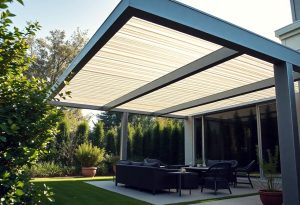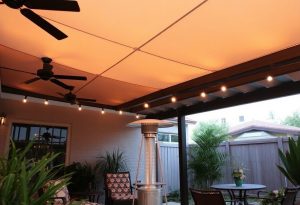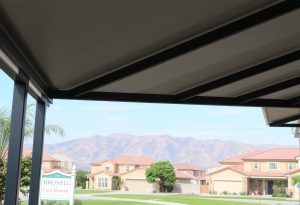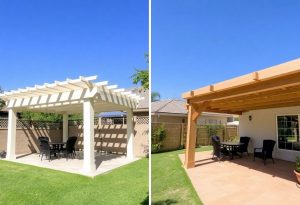Introduction
When it comes to enhancing your outdoor living space, aluminum patio covers are a popular choice due to their durability and versatility. Whether you want to create a shaded area for relaxation or protect your patio from the elements, aluminum patio covers provide numerous benefits. One crucial aspect to consider is whether to choose insulated or non-insulated aluminum patio covers. Understanding the difference between the two options is essential in order to make an informed decision. In this article, we will explore the benefits of aluminum patio covers and delve into the specifics of insulated and non-insulated options.
Benefits of Aluminum Patio Covers
Aluminum patio covers offer a range of benefits that make them a popular choice for enhancing outdoor living spaces. These covers are highly durable and resistant to weather conditions, such as rain and UV rays. They are also versatile, allowing for customization to fit the specific requirements of your patio. Additionally, aluminum patio covers require minimal maintenance, making them a long-lasting and cost-effective option. Whether you want to create shade or protect your patio, aluminum covers provide a stylish and practical solution.
Understanding the Difference: Insulated vs Non-Insulated
Insulated and non-insulated aluminum patio covers offer different features and benefits. Insulated covers are designed with a layer of insulation sandwiched between two aluminum panels. This provides better temperature control and energy efficiency, making them ideal for hot and cold climates. Non-insulated covers, on the other hand, do not have insulation and offer a more cost-effective option. The choice between the two depends on your specific needs and budget.
Insulated Aluminum Patio Covers
Insulated aluminum patio covers are designed with a layer of insulation sandwiched between two aluminum panels. This insulation provides numerous benefits for homeowners. Firstly, it enhances energy efficiency, helping to regulate the temperature and reduce heating and cooling costs. Additionally, insulated patio covers offer superior temperature control, keeping the space cooler in hot weather and warmer in cold weather. This makes them an ideal choice for those living in extreme climates.
Insulated Aluminum Patio Covers: Energy Efficiency
Insulated aluminum patio covers are highly energy efficient due to the layer of insulation sandwiched between the aluminum panels. This insulation helps to regulate the temperature, reducing the need for heating or cooling systems and resulting in lower energy consumption. The insulation also prevents heat transfer, keeping the patio area cooler in hot weather and warmer in cold weather, allowing homeowners to enjoy their outdoor space in comfort throughout the year. Additionally, the enhanced energy efficiency of insulated aluminum patio covers can lead to lower energy bills and contribute to a more sustainable and eco-friendly home.
Insulated Aluminum Patio Covers: Temperature Control
Insulated aluminum patio covers provide excellent temperature control for outdoor spaces. The insulation layer in these covers acts as a barrier, preventing heat from entering during hot weather and retaining warmth during colder months. This temperature regulation allows homeowners to comfortably enjoy their patio areas throughout the year. By minimizing heat transfer, insulated aluminum patio covers create a pleasant outdoor environment regardless of the weather conditions.
Non-Insulated Aluminum Patio Covers
Non-Insulated Aluminum Patio Covers are a popular choice for those looking for a cost-effective outdoor shading option. While they may not provide the same level of energy efficiency as insulated covers, they are still durable and long-lasting. These covers are resistant to weather elements and require minimal maintenance. Non-insulated aluminum patio covers are a budget-friendly solution that can enhance the aesthetics of any outdoor space.
Non-Insulated Aluminum Patio Covers: Cost-effectiveness
Non-Insulated Aluminum Patio Covers are a cost-effective solution for those looking to enhance their outdoor space on a budget. These covers are generally more affordable compared to insulated options. Their lower price doesn’t compromise their durability, as non-insulated aluminum covers are still resistant to weather elements and require minimal maintenance. Choosing a non-insulated aluminum patio cover allows homeowners to create a stylish and functional outdoor area without breaking the bank.
Non-Insulated Aluminum Patio Covers: Durability
Non-insulated aluminum patio covers are incredibly durable and built to withstand various weather conditions. Made from high-quality aluminum, these covers are resistant to rust, corrosion, and fading. They are also lightweight yet sturdy, ensuring long-lasting durability. Non-insulated aluminum patio covers are designed to withstand heavy rain, strong winds, and intense sunlight without deteriorating. With minimal maintenance required, these covers provide a durable solution for enhancing your outdoor space.
Comparison
When comparing insulated and non-insulated aluminum patio covers, it is important to consider the specific benefits that each option offers. Insulated aluminum patio covers provide enhanced energy efficiency and temperature control, making them ideal for those who desire a comfortable outdoor space year-round. On the other hand, non-insulated aluminum patio covers are cost-effective and offer durability, making them a practical choice for those on a budget. Understanding these differences can help you make an informed decision regarding which type of patio cover is best suited to your needs.
Insulated vs Non-Insulated Aluminum Patio Covers: Pros and Cons
Insulated aluminum patio covers offer several advantages, including enhanced energy efficiency and temperature control. They provide insulation that helps keep the patio area cooler in summer and warmer in winter, making it more comfortable for year-round use. On the other hand, non-insulated aluminum patio covers are more cost-effective and durable. They provide basic protection from the elements without the added insulation benefits. Ultimately, the choice between insulated and non-insulated patio covers depends on your specific needs and budget.
Factors to Consider Before Choosing
Before choosing between insulated and non-insulated aluminum patio covers, there are a few factors to consider. First, think about your specific needs and preferences. Do you prioritize energy efficiency and temperature control? Are you working within a tight budget? Secondly, consider the climate in your area. If you live in an extremely hot or cold region, insulated patio covers may be more beneficial. Lastly, assess the installation and maintenance requirements, as well as the overall cost, to ensure you make an informed decision.
Installation and Maintenance
Installation and maintenance are important factors to consider when choosing between insulated and non-insulated aluminum patio covers. The installation process for both types is generally straightforward and can be done by professionals. Maintenance for non-insulated patio covers is relatively simple, requiring regular cleaning and occasional touch-ups. Insulated patio covers may require more frequent maintenance, such as checking for any damage to the insulation material and ensuring proper sealing. Regular inspections and maintenance will help extend the lifespan of your aluminum patio cover.
Installation Process: Insulated and Non-Insulated Patio Covers
The installation process for both insulated and non-insulated aluminum patio covers is typically straightforward and can be done by professionals. Insulated patio covers require additional steps due to the insulation material. These may include placing the insulation material between the aluminum sheets and ensuring a proper sealing. Non-insulated patio covers, on the other hand, involve attaching the aluminum sheets directly to the structure. Following the manufacturer’s guidelines and employing the expertise of professionals will help ensure a proper and secure installation.
Maintenance Tips for Longevity
To ensure the longevity of both insulated and non-insulated aluminum patio covers, regular maintenance is crucial. Here are some essential maintenance tips:
- Regular cleaning: Remove debris, dirt, and leaves from the patio cover using a soft brush or cloth. Avoid using abrasive cleaners that can damage the finish.
- Inspect for damage: Check for any signs of rust, cracks, or loose screws regularly. Repair or replace any damaged parts promptly to prevent further deterioration.
- Apply protective coatings: Apply a protective coating or sealant to the aluminum surface to enhance its resistance to the elements and preserve its appearance.
- Clear away snow and ice: In colder climates, remove snow and ice from the patio cover to prevent the weight from causing structural damage.
- Trim nearby trees: Trim tree branches that hang over the patio cover to avoid falling debris and potential damage.
By following these maintenance tips, you can prolong the lifespan of your aluminum patio cover and keep it looking good as new for years to come.
Conclusion
In conclusion, when choosing between insulated and non-insulated aluminum patio covers, it is important to consider your specific needs and priorities. Insulated covers offer better energy efficiency and temperature control, while non-insulated covers are more cost-effective and durable. By understanding the benefits and differences of each type, you can make an informed decision that suits your lifestyle and budget. Remember to also consider the installation process and maintenance requirements to ensure the longevity and performance of your aluminum patio cover.
Choosing the Right Aluminum Patio Cover for Your Needs
Choosing the right aluminum patio cover comes down to understanding your specific needs and priorities. Consider factors such as energy efficiency, temperature control, cost-effectiveness, and durability. If you prioritize energy efficiency and temperature control, then an insulated aluminum patio cover may be the best choice. However, if cost-effectiveness and durability are more important to you, a non-insulated aluminum patio cover might be the better option. Ultimately, assess your unique requirements to make an informed decision that suits your lifestyle and budget.






